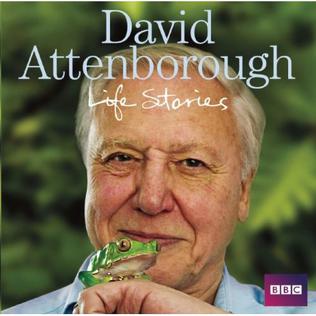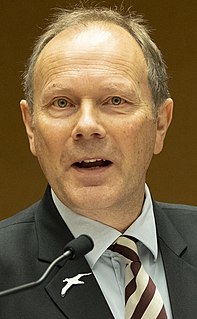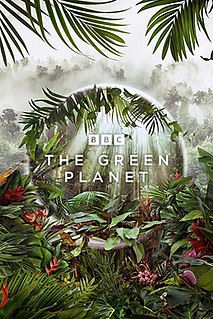Related Research Articles

Sir David Frederick Attenborough is an English broadcaster, biologist, natural historian and author. He is best known for writing and presenting, in conjunction with the BBC Natural History Unit, the nine natural history documentary series forming the Life collection, a comprehensive survey of animal and plant life on Earth.

The Life of Mammals is a nature documentary series written and presented by David Attenborough, first transmitted in the United Kingdom from 20 November 2002.

Natural World is a strand of British wildlife documentary programmes broadcast on BBC Two and BBC Two HD and regarded by the BBC as its flagship natural history series. It is the longest-running documentary in its genre on British television, with nearly 500 episodes broadcast since its inception in 1983. Natural World programmes are typically one-off films that take an in-depth look at particular natural history events, stories or subjects from around the globe.
This is a chronological list of selected television programmes and feature films produced or co-produced by the BBC Studios Natural History Unit since its inception in 1957. It is not intended to be exhaustive given the large amount of material the Unit has produced in its history, but it does capture all the major TV series and films for which it has gained recognition. A brief synopsis of pre-1957 radio and television programmes on a natural history theme made by the BBC is given in the History section of the main BBC Studios Natural History Unit article.
The Amber Time Machine is a BBC documentary written and presented by David Attenborough. It's the 12th episode of the 22nd series of the British wildlife documentary television series Natural World. It was first transmitted in 2004 and later became part of the Attenborough in Paradise and Other Personal Voyages collection of seven documentaries.

The Living Planet: A Portrait of the Earth is a BBC nature documentary series written and presented by David Attenborough, first transmitted in the UK from 19 January 1984.

David Attenborough's Life Stories is a series of monologues written and spoken by British broadcaster David Attenborough on the subject of natural history. They were broadcast on BBC Radio 4 in 2009 as part of the station's "Point of View" strand, in the weekly timeslot formerly occupied by Alistair Cooke's Letter from America. In each of the 20 programmes, Attenborough discusses a particular subject of personal resonance, drawing on his experience of six decades filming the natural world. The series was produced by Julian Hector, head of radio at the BBC Natural History Unit.

Madagascar is a British nature documentary series, first broadcast on BBC Two and BBC HD in February 2011. Produced by the BBC Natural History Unit and Animal Planet and narrated by David Attenborough, the three-part series focuses on the landscape and wildlife of the island of Madagascar in the Indian Ocean. Attenborough also appears briefly on camera at the beginning and end of the series. Each episode is followed by a ten-minute Madagascar Diaries segment, illustrating the techniques used to film a particular subject.
Attenborough: 60 Years in the Wild is a three-part BBC documentary series chronicling the 60 years career making wildlife programmes of Sir David Attenborough. The first hour-long programme, titled "Life on Camera" was broadcast on Friday 16 November 2012 on BBC Two at 9pm. The second part, "Understanding the Natural World" and third and final part, "Our Fragile Planet" were broadcast on following Fridays, 23 and 30 November 2012.
David Attenborough's Natural Curiosities is a British nature documentary series first broadcast on Eden in January 2013, Produced by Humble Bee Films, Sir David Attenborough presents the series which puts a spotlight on some of nature's evolutionary anomalies and how these curious animals continue to baffle and fascinate.
David Attenborough's Conquest of the Skies 3D is a British natural history television series tracking the evolution of flight in animals. Attenborough analyses gliding reptiles, parachuting mammals, acrobatic insects and the world of birds.
Triumph of the Vertebrates is a 2013 British documentary film by David Attenborough. It is about the evolution of vertebrates. The first part is From the Seas to the Skies, while the second part is Dawn of the Mammals.

Julian Hector is a British television and radio producer and executive who is Head of the BBC Natural History Unit. During his career, he has been producer of David Attenborough's Life Stories on BBC Radio 4, producer of the Tigers about the House television series, writer and producer of the Lakes and Rivers episode in the BBC’s Wild Africa series, producer of World on the Move, and instrumental in establishing the BBC's Tweet of the Day. He was described by Sir David Attenborough as ‘one of the most inventive producers in radio’ and during his award of an honorary Doctorate from the University of Bristol was credited with bringing ‘live natural history programming to Radio 4’.

Curiosity Stream is an American media company and subscription video streaming service that offers documentary programming including films, series, and TV shows. It was launched in 2015 by the founder of the Discovery Channel, John S. Hendricks. As of 2021, it was reported to have approximately 20 million subscribers worldwide across its direct and bundled platforms.

Planet Earth II is a 2016 British nature documentary series produced by the BBC as a sequel to Planet Earth, which was broadcast in 2006. The series is presented and narrated by Sir David Attenborough with the main theme music composed by Hans Zimmer.

Geo Television is a German-language pay-TV station of the RTL Group. It is the TV offshoot of the magazine with the same name (GEO). Geo Television focuses on reports and documentaries.

Our Planet is a British nature documentary series made for Netflix. The series is narrated by David Attenborough and produced by Silverback Films, led by Alastair Fothergill and Keith Scholey, who also created BBC documentary series Planet Earth, Frozen Planet and The Blue Planet, in collaboration with the conservation charity World Wildlife Fund (WWF).

A Perfect Planet is a 2021 five-part earth science series presented by David Attenborough. The first episode premiered on 3 January 2021 on BBC One. Filming took place over four years, across 31 countries, with crew navigating difficulties in extreme temperatures and remote locations. The editing process was affected by the COVID-19 pandemic. The series covers volcanoes, the sun, weather and oceans, with the final episode focusing on human impact on the environment. It received positive critical reception.
Life in Colour is a 2021 British-Australian nature documentary miniseries presented and narrated by David Attenborough. It consists of three episodes.

The Green Planet is a 2022 nature documentary series on plants and their relationship with animals, humans and the environment. It was produced by BBC Studios Natural History Unit and narrated and presented by David Attenborough.